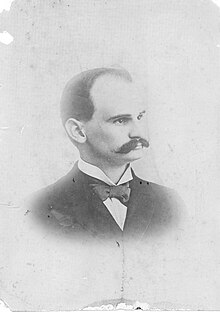John Gary Evans
John Gary Evans (born October 15, 1863 in Cokesbury , Greenwood County , South Carolina , † June 27, 1942 in Spartanburg , South Carolina) was an American politician and governor of the state of South Carolina from 1894 to 1897 .
Early years and political advancement
John Evans was the son of Nathan George Evans , a general in the Confederation Army . After primary school in his native Evans attended Union College in Schenectady ( New York ). He had to break off his studies in 1883 for financial reasons, but later made up for his law degree. He was admitted to the bar in South Carolina in 1887 and practiced in Aiken .
As a lawyer he got involved with the poor farmers and came in contact with the Farmers Association . In the 1880s, this group was a significant political force in South Carolina. Evans developed good relationships with Benjamin Ryan Tillman , the leader of this movement that established itself within the Democratic Party . Thanks to these relationships, he achieved a rapid political rise. Between 1888 and 1892 he was a member of the House of Representatives from South Carolina ; from 1892 to 1894 he was a member of the State Senate . In 1894 he was nominated as a Democratic candidate for the gubernatorial election and was elected governor in the elections with 69.6% of the vote against Sampson Poe (30.4%) as Tillman's successor. At age 31, he became the youngest ever governor of South Carolina.
Governor of south carolina
Evans continued his predecessor's policy as governor. In 1895 a new constitution for South Carolina was enacted. This was extremely racist and conservative. The black population was practically deprived of the right to vote because this right was linked to the property and income of the citizens. The racial segregation in schools was legalized and marriages between the races were prohibited by law. This political stance was upheld by the Supreme Court in 1896. The verdict in the case of Plessy versus Ferguson founded the theory that equal the races are but separate ( separate but equal ). This problem was to occupy the southern states and thus also South Carolina until the middle of the 20th century. Another passage in the new constitution related to the governor's term of office, according to which a legislative term lasted two years. After that, an incumbent governor could be directly re-elected once. Three consecutive terms of office were not allowed. These provisions were in effect until 1926. On the other hand, the governor's government tried to put a stop to the then widespread lynching . Each county had to pay a fine of $ 2,000 to the families of the victims for each lynching.
Further life
Governor Evans did not seek a second term in 1896 and therefore resigned on January 18, 1897. In the following years he applied for a seat in the US Senate without success . Instead, he joined the army as a major at the outbreak of the American-Spanish War in 1898. After the war he was involved in building a civilian government in Cuba . As a result he worked again as a lawyer. Evans was a participant in the Democratic National Conventions of 1900, 1912 and 1916. Between 1914 and 1930 he served on the board of the Democratic Party in South Carolina. John Evans died in June 1942. He was married to Emily Mansfield Plume.
Web links
- John Evans at the National Governors Association (English)
- South Carolina Information Highway (English)
- Biography (English)
- John Gary Evans in the database of Find a Grave (English)
| personal data | |
|---|---|
| SURNAME | Evans, John Gary |
| BRIEF DESCRIPTION | American politician |
| DATE OF BIRTH | October 15, 1863 |
| PLACE OF BIRTH | Cokesbury , South Carolina |
| DATE OF DEATH | June 27, 1942 |
| Place of death | Spartanburg , South Carolina |

